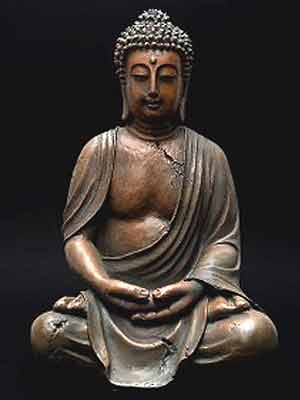 Madhyamaka is one of the four Indian Buddhist tenet systems that do not assert the true existence of any thing. Madhyamaka prescribes that every phenomena is empty of "substance". They have no intrinsic reality apart from the causes and conditions from which they originate. Madhyamaka is basically a rejection of two extreme views thereby representing a middle way. In order to approach prajnaparamita Madhyamaka is the major source. However all Mahayana schools abide by the Madhyamaka view.
Madhyamaka is one of the four Indian Buddhist tenet systems that do not assert the true existence of any thing. Madhyamaka prescribes that every phenomena is empty of "substance". They have no intrinsic reality apart from the causes and conditions from which they originate. Madhyamaka is basically a rejection of two extreme views thereby representing a middle way. In order to approach prajnaparamita Madhyamaka is the major source. However all Mahayana schools abide by the Madhyamaka view.
Shantarakshita had put forward a Yogacara and Madhyamaka synthesis in the 8th century. This view approaches ultimate truth through the method of prasanga. However while speaking of tradition the earlier Svatantrika and Yogacara approaches are preferred.
Yogacara Svatantrika Madhyamaka is at times mistaken as a Svatantrika or Yogacara view. This view is a synthesis of Madhyamaka and Yogacara.
The Madhyamaka concept of emptiness is explained through the related concept of interdependence. Initially in Mulmadhyamakakarika, Nagarjuna provides arguments that causes and conditions are empty of essence. This analogy connects the conclusion of the Middle way tenets with the co dependent origination teachings of the first turning.
Madhyamaka and Yogacara are the two main philosophical route associated with the Mahayana Buddhism. Madhyamaka develops metaphysical concerns. The subtle character of Madhyamaka arguments has fascinated as well as perplexed scholars. Madhyamaka is the Indian Buddhist school of thought that develops in the form of commentaries based on the works of Nagarjuna who flourished around 150 C.E.
Proponents of Madhyamaka have exploited a long-invoked Buddhist figure of speech.
The foundational idea of Madhyamaka is that the ultimately existent thing is empty. Followers of Madhyamaka promote emptiness.
The conviction of the Madhyamaka School is that the middle path can be achieved by a denial that things have any intrinsic nature at all. This doctrine of universal emptiness is the hallmark of the school, which places the school in the tradition associated with the prajnaparamita literature of Mahayana Buddhism. One of the areas in which Madhyamakas differ from one another is in their attitude towards the school of Mahayana Buddhism, the Yogacara School. Madhyamikas portrayed Yogacara as a philosophy that prepares one intellectually and emotionally for the difficult truth. This text is considered as an epitome of Jainism. It is more than seventeen hundred years old. According to tradition it has descended from the sixth Anga, Jnatridharmakatha and the second Purva, Agrayini. It is believed that one recitation of this book is as pious as keeping a fast of one day



















